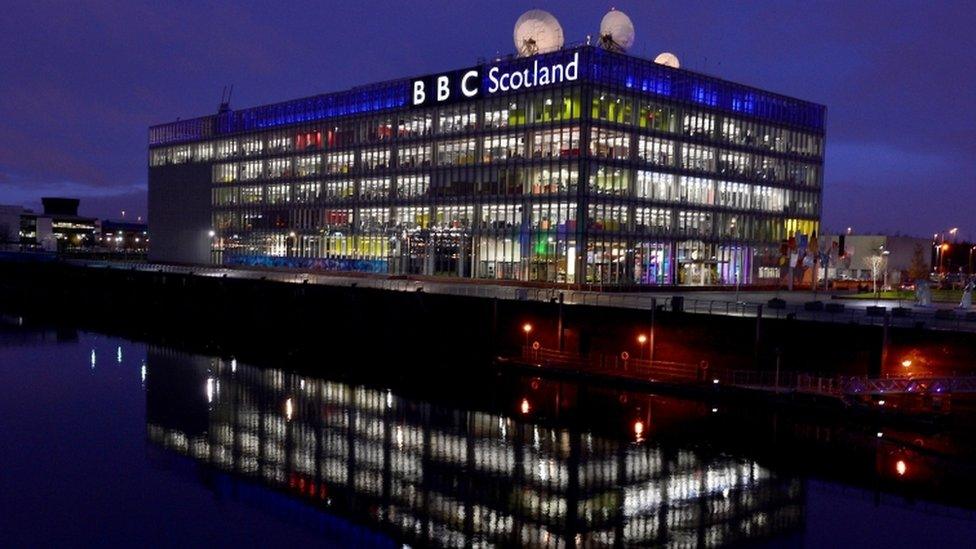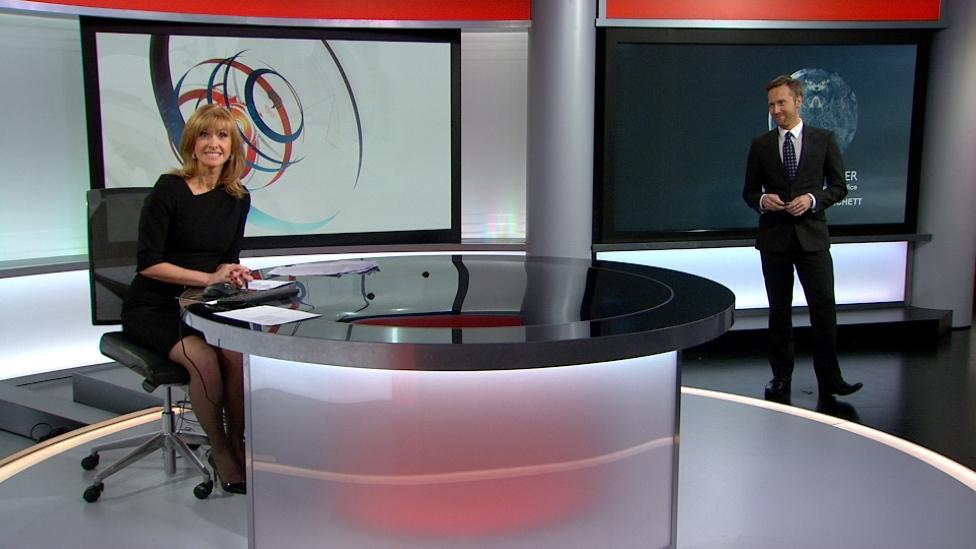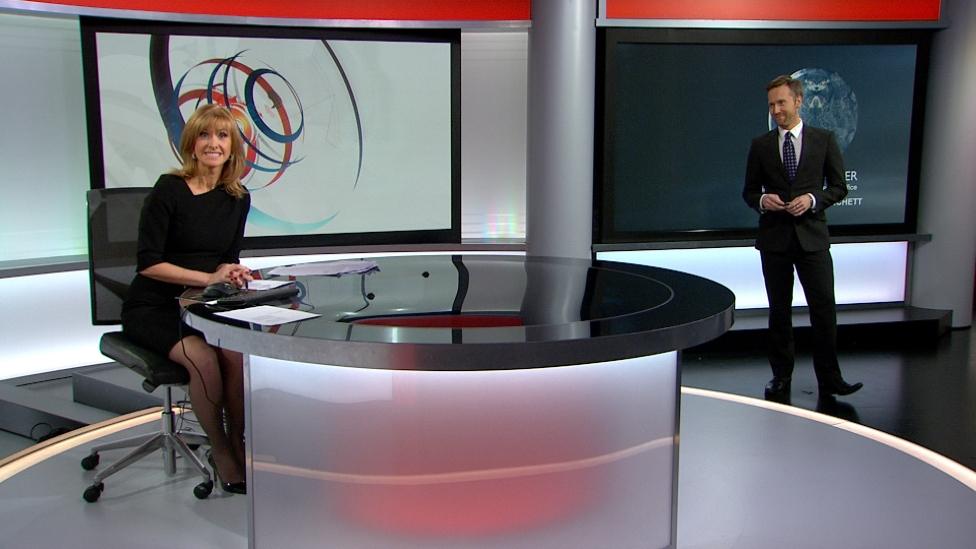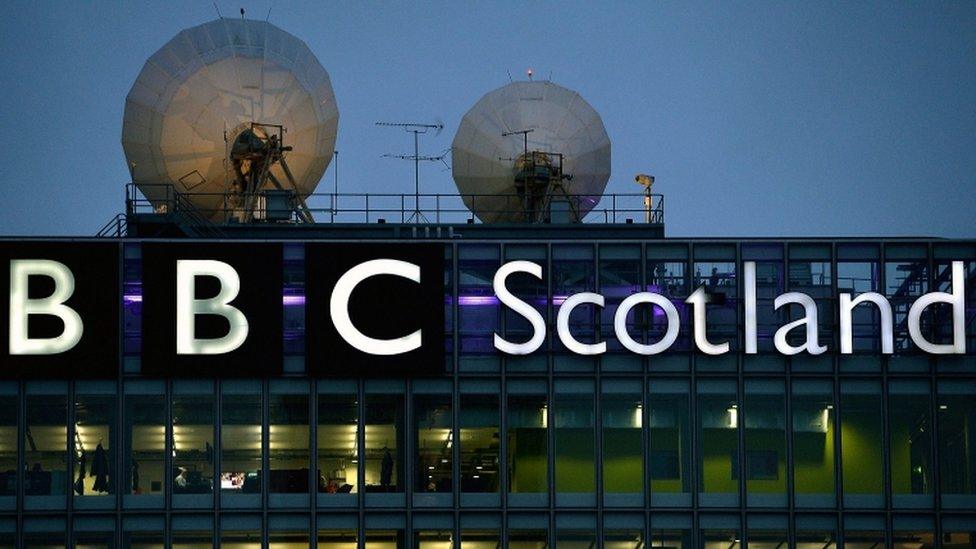UK Culture Secretary Karen Bradley says 'Scottish Six' is matter for BBC
- Published

The idea of a Scottish Six has been a long-running issue in Scotland
The decision to introduce an hour-long TV news programme in Scotland is a matter for the BBC, according to the UK's culture secretary.
Karen Bradley made the comment as she announced the corporation's new charter in the House of Commons.
She said the BBC was the nation's broadcaster and would be expected to reflect the national mood and news.
But she said a decision over the so-called Scottish Six was a matter of editorial independence.
BBC Scotland has produced pilots for a programme which could replace Reporting Scotland and the Six O'Clock News in Scotland.
A spokesman for BBC Scotland said: "Work on our output continues and we expect to conclude that before the end of the year."
A further two pilots will be produced by the team in Glasgow in the next week.
It comes after criticism that the current six o'clock news programme, broadcast from London, was not always relevant to Scottish viewers in the wake of continued devolution, especially on issues concerning health and education.
Speaking in response to a question from the SNP's culture spokesman John Nicolson - who said the issue should be "entirely the responsibility of the BBC" - Mrs Bradley said: "I want to be clear, the BBC is the nation's broadcaster and I expect the BBC to reflect the national mood and the national news, that is important across the whole nation.
"He is right that it is for the BBC, who have operational independence in this matter, to determine how exactly they make that happen."

Analysis by BBC Scotland's Business and Economy editor Douglas Fraser

Proposals for a Scottish Six would see the current Reporting Scotland programme format changed
There's predictable fascination with the startling amounts some TV presenters make, and glee that it'll be brought into the open under UK government plans for the BBC.
But the Charter published by the new Culture Secretary has plenty more significant elements that could be smothered by coverage of that.
One is the role of Ofcom. Already having a huge remit across telecoms, postal services and commercial broadcast, it is taking on a big regulatory role for the BBC as well.
It will set the expectations of what the BBC should provide - in hours broadcast, in range, diversity and quality - and holding the Corporation to account on whether it's delivering.
So long as Ofcom is itself seen to be independent, then that should put the BBC at a longer arm's length from government interference.
The Charter sets a very broad outline of the minimum the BBC should provide in Scotland, specifically in opt-outs from the main TV channels, in having a national radio station, and in its Gaelic services.
It leaves Ofcom to fill in the details beyond that. And it leaves the BBC to make some of the most sensitive decisions about the way it mixes a British network "shared experience" with distinctive Scottish output.
Where it says "the BBC should bring people together for shared experiences and help contribute to the social cohesion and wellbeing of the United Kingdom", that will be interpreted by some as more pro-union than the BBC's impartiality should allow it to be.
Yet those words are already being interpreted by others as a sign that the plans for a Scottish Six of integrated TV news - Scottish, UK and international, brought together from a Glasgow studio - is a dead duck.
Not so, says BBC Scotland. It is running pilots this autumn, and will make a decision after seeing how audiences respond to them. By omission, the Charter leaves that as an editorial choice.
Likewise, a second national Radio Scotland station is a decision for the Corporation - perhaps splitting news and sport from music and other culture.
The idea of a Scottish digital channel, including that integrated news and lots of newly commissioned programme strands for six or so hours each evening, was favoured by the Scottish government. It's not mentioned in the Charter. Nor is it ruled out. But it looks a daunting financial stretch for BBC Scotland to deliver.
Questions about that can be raised by MSPs under the new governance rules. The Scottish government has quickly served notice that it is not satisfied with the lack of a BBC Scotland board and the lack of autonomy for BBC Scotland managers.
But it will be answerable to the Scottish Parliament. MSPs will be able to summon BBC chiefs to Holyrood on the same basis as MPs have been able to do at Westminster.
That means accountability on resourcing and policy, on which there's lots of room for tension. It doesn't mean oversight of the running order of news items on Reporting Scotland.

Earlier this month, Westminster's culture committee said the corporation should press ahead with plans for an hour-long news programme.
A Scottish Six has been a long-running idea within Scottish broadcasting, with previous proposals being ruled out in 2006.
The Scottish government has led calls for a more Scottish-focused six o'clock broadcast.
And an inquiry by Labour peer Lord David Puttnam has also recently backed the idea of a Scottish Six, along with more devolution in BBC budgets.
- Published29 June 2016

- Published17 February 2016
